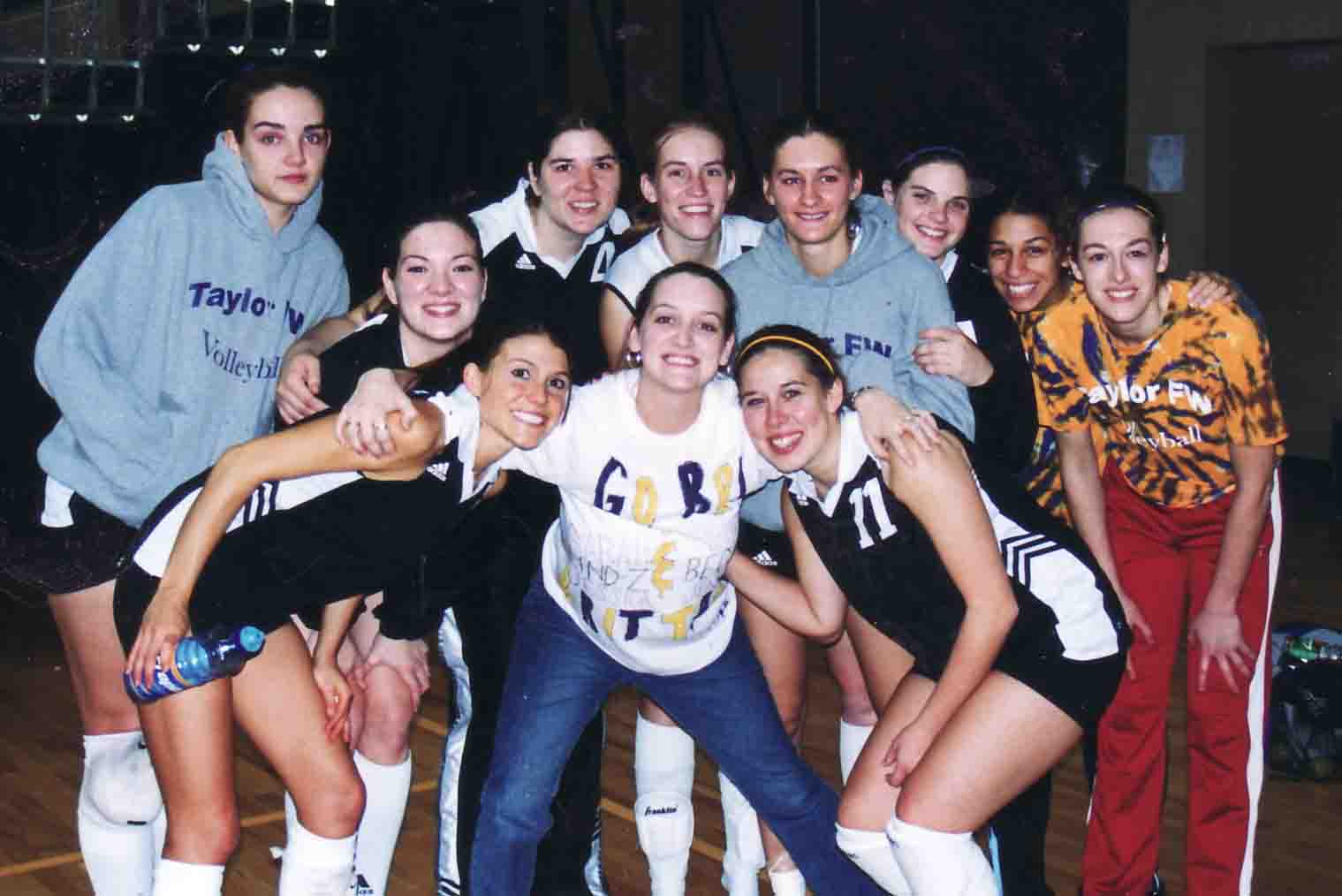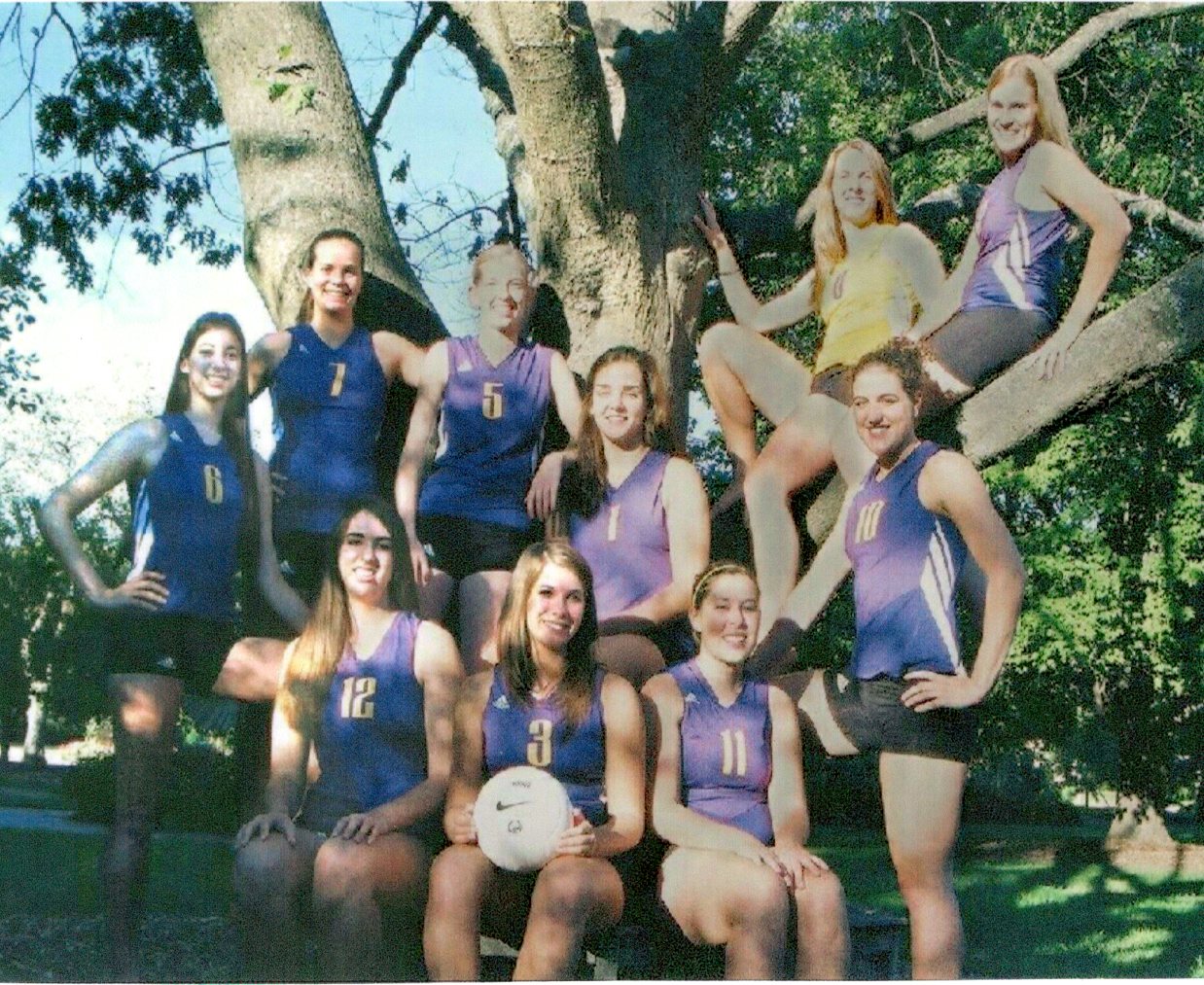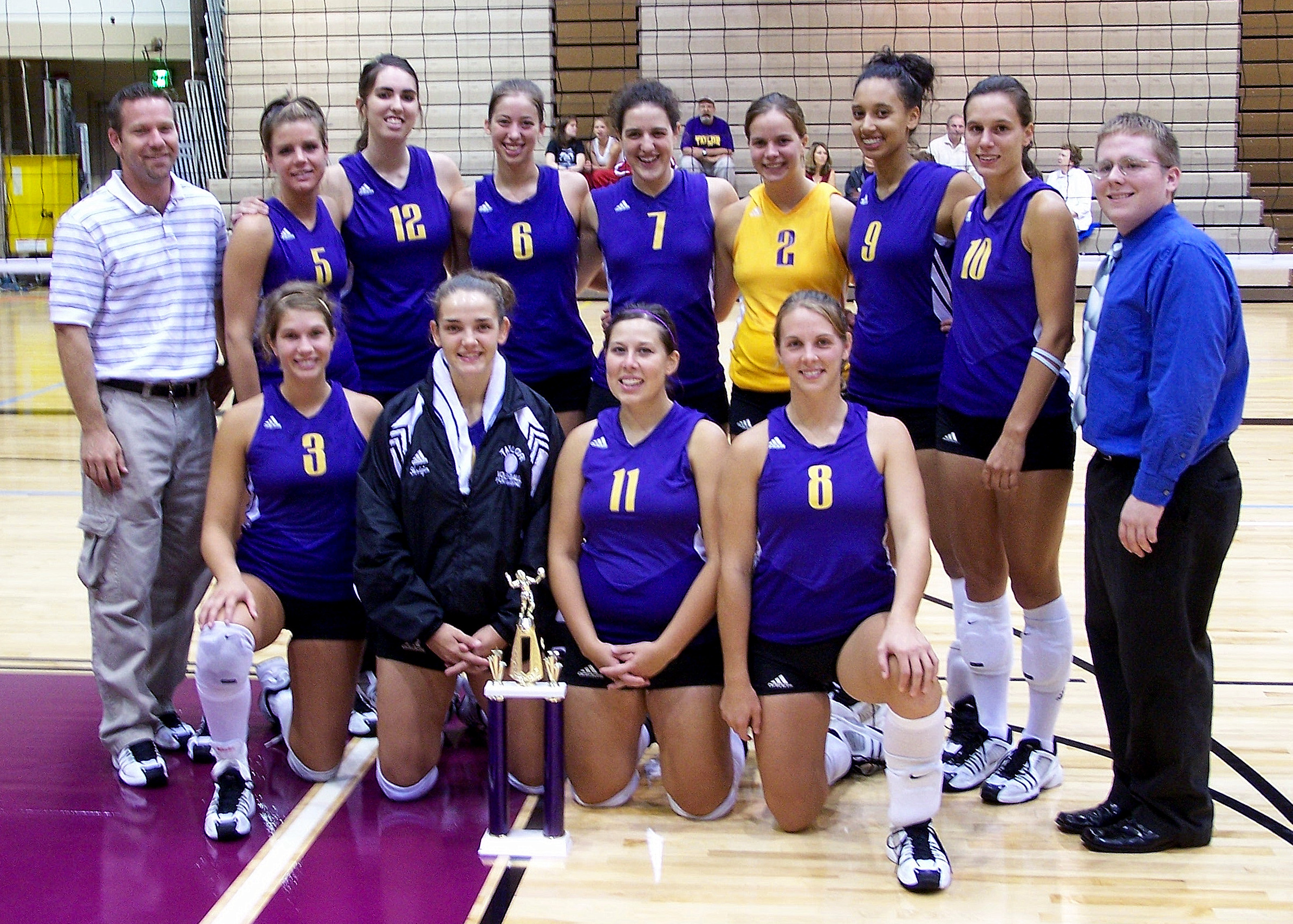2004, 2005, 2006 Women's Volleyball Teams
\The 2004-06 Taylor University Fort Wayne (TUFW) women’s Lady Falcons volleyball team had the longest period of success in school history. The 1984 Fort Wayne Bible College volleyball team had the best overall record at 26-1, but no other volleyball teams finished higher nationally than these three TUFW teams.
For three successive years, 2004, 2005, and 2006, the Lady Falcons placed 3rd, 2nd, and 2nd, respectively, in the national tournament matches in their own home gym, when TUFW hosted the United States Collegiate Athletic Association (USCAA) National Tournaments starting in 2003.
“We were playing way above our level,” TUFW Volleyball Coach Scott Haddix g94, said. “What those girls had was just a great work ethic. It was a beautiful culture, and a whole lot of fun to coach.”
 In 2004, the team with a 23-13 record, finished third in the USCAA National Tournament.
In 2004, the team with a 23-13 record, finished third in the USCAA National Tournament.
The team was led by senior Lindsay Stipp g05, who dished out 1,381 assists, and sophomore Sarah Hodgin g07, with 626 kills. By the time Lindsay graduated, she would set a new school record for assists with 4,045, and Sarah would eventually set the new campus record for kills, kills per set, and total digs. Both would be named to the National Tournament Team, and both received the USCAA All-American Award.
Freshman Dani Partee g08 and Junior Angie Hoeppner g06 were named USCAA All-American honorable mentions, and sophomore Jessica Warriner g07 received an Academic All-American Award.
“Using our volleyball talents to express our love for Jesus Christ was our number one goal for the season this year. I think we have done that really well,” Hodgin said in the Alumnus magazine.
 Then in 2005, featuring seasoned upperclassmen and a new freshman, Megan Spillman g09, the team finished 24-15 for the season and took 2nd in the USCAA Tournament.
Then in 2005, featuring seasoned upperclassmen and a new freshman, Megan Spillman g09, the team finished 24-15 for the season and took 2nd in the USCAA Tournament.
As wins added up, Jessica and Megan both mentioned how much the “small close-knit family environment” and unbelievable chemistry between players led to the team being successful beyond expectations. “No other teams seemed to have what we had,” Jessica said.
During the 2005 campaign, Sophomore Cassie Warriner g08 took over the setter position dishing out 1,501 or 10.65 assists per game. She would eventually eclipse Lindsay with just a few games left in the 2007 season to set the school record for the most assists by a Falcon. Sarah continued to lead with 556 kills closely followed by newcomer, Megan, with 527. Angie (40) and Dani (38) led the team in blocks to lead the defense.
Perhaps the biggest win of 2005 was the defeat of Indiana Tech, a cross-town rival, for the first time. “Since we did not have a conference, Scott created our own, and it was sort of a big deal to beat a team like Tech,” Jessica explained.
 The 2006 women's volleyball team finished the season 22-15 and placed second in the national tournament again. The 2006 Lady Falcons added local athletes and a transfer student to an already talent-filled roster. Two freshmen, Ashley Inge g09 (52 aces) and Brittani Axt fs10, and junior transfer, Danielle Elwood g08 (72 blocks), joined forces with the experienced TUFW team.
The 2006 women's volleyball team finished the season 22-15 and placed second in the national tournament again. The 2006 Lady Falcons added local athletes and a transfer student to an already talent-filled roster. Two freshmen, Ashley Inge g09 (52 aces) and Brittani Axt fs10, and junior transfer, Danielle Elwood g08 (72 blocks), joined forces with the experienced TUFW team.
That year’s starting line-up mixed leadership and experience. Seniors included Hodgin, a three-time USCAA All-American, and Jessica Warriner (331 digs), a three-time Academic All-American. Junior setter and First Team USCAA All-American Cassie Warriner, added another offensive threat, averaging over 11.3 assists per game. Rounding out the Falcon line-up was sophomore outside hitter and First Team USCAA All-American and All-Academic Spillman, and junior Elwood. Completing the line-up were senior Becca Eleiott g06, Brittany Marshall g06, and juniors Dani, and Rachel Kindle fs08.
Although they never brought home a national championship trophy, the teams of 2004 – 2006 were remarkable in how they demonstrated perseverance and commitment despite difficult circumstances.
The Lady Falcons often competed against programs that had far more scholarship dollars to give away. “Several competing schools had single players on their rosters that received more scholarship dollars than we could provide to our entire roster,” Haddix said.
Tight budgets also meant long trips to away games in an overcrowded van and lunching on baloney sandwiches from the cafeteria.
Megan remembers those van rides vividly. “We were all crammed in there together, and Seth Brase, our statistician, would sing ridiculous songs from the front seat and dance at stop lights.” She also remembers the Chinese fire drills when stuck by a train and the secret sister gift exchanges with the funniest items. “We worked hard on and off the court, but it always just seemed fun,” Megan said, despite playing most of her career with two back fractures and asthma. Megan would still finish her career with the second highest number of kills for the Falcons.
These teams won in a more significant way than points scored on a court: they learned to work hard, together, to accomplish a goal bigger than themselves. “Wins are great, but . . . it’s the ability to figure out how this competition, how this sport, is going to help you overcome things in life,” Scott said. “That translates to your classroom work and your court work, and, most importantly, your life work.”
As success builds, teams can often forget the foundational stepping stones it took to become great.
During the 2001 season, the Lady Falcons were in a heated competition with Indiana University Northwest in the final game of the year, with two sets to go. Coach Haddix was focused, his attention fixed on each moment, each play, that was bringing them closer to victory. In the middle of the deciding set, a wave of excitement, even giddiness, broke out among the team. Scott remembers that one of the players came running up to him, breaking through his wall of concentration: “Coach, coach,” she said, “We will not have a losing record!”
She was right. The 2001 season ended 20-18, the first time in over a decade that the TUFW volleyball program finished with a winning record. “That was just one of those moments where you realize that things are turning in the right direction,” Scott said. “A lot of success followed after that season.”
For the Lady Falcons, the foundation for that success was laid when Amanda Chapman g99 joined the women’s volleyball team in 1995. The campus transition a few years earlier had left the athletic programs floundering. Morale was low, propounded by loss upon loss.
Amanda’s upbeat attitude and gritty work ethic restarted the team’s forward momentum. She was all in – and expected the same from her teammates. “More than anything, she started to help us turn around a dynamic of, ‘This program isn’t going to be successful, we never win’ . . . to, ‘It doesn’t matter what our circumstances (are), we can be the best group of athletes we can be,’” Scott said. “She was really the cornerstone of all that was about to come.”
The program’s appeal continued to grow as Khristina Peppas g04 came onto the scene. A kindred spirit with Amanda, she brought significant volleyball talent. This combination of prowess and positivity attracted a succession of gifted players, including Brenda McDonald g04, the program’s next Chapman and Peppas, who would lead the program to even greater heights. Each year, new players came in who contributed to a solid roster that allowed the team to put together a playing schedule that was increasingly challenging.
Ultimately, the struggles of the early days, coupled with key individuals like Amanda, Khristina, and Brenda culminated in the program’s successful run from 2004-2006 and beyond.



